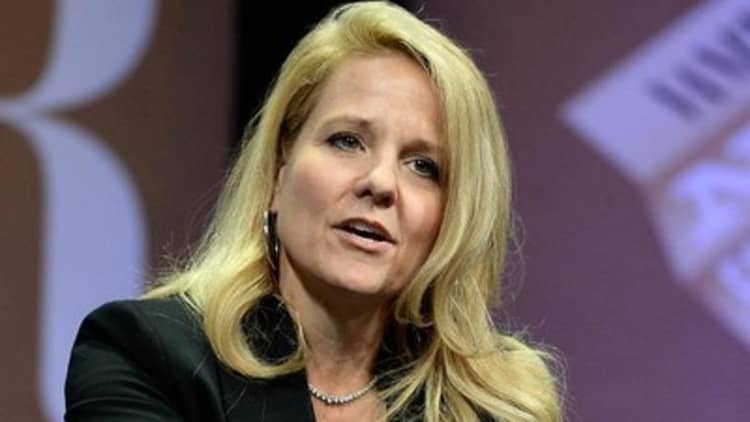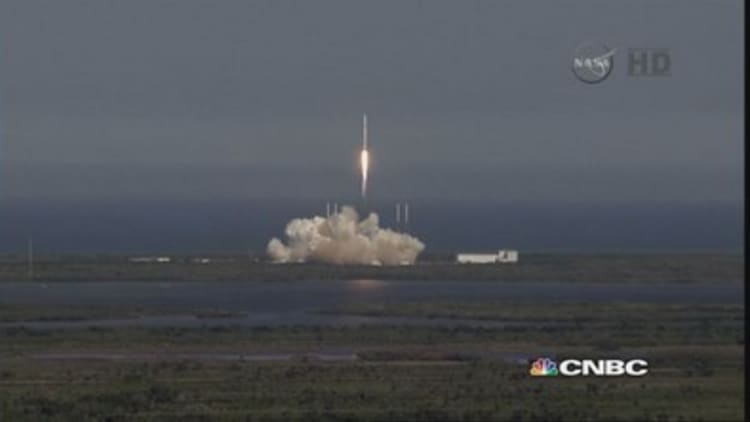
In an industry in which change traditionally happens at a crawl, Elon Musk's commercial space venture SpaceX has proved that even the most entrenched status quo is vulnerable to upheaval. As the privately-held company and its Falcon 9 rocket gets closer to receiving U.S. Air Force certification to launch military and spy satellites, fierce competitors are nipping at its heels in hopes of grabbing a piece of the $5.4 billion niche market SpaceX continues to grow.
Now the question is: Will archrivals disrupt SpaceX?
Just five years ago, its Falcon 9 rocket—a two-stage launch vehicle capable of hauling nearly 30,000 pounds to low-Earth orbit—had never made the journey to space. Now it regularly services the International Space Station, enjoys a multiyear backlog of commercial payload missions worth billions and could soon begin carrying humans into outer space for NASA by 2017. A key safety test of its Dragon crew capsule last week went off without a hitch.
Read MoreFULL LIST: 2015 DISRUPTOR 50
Last week's crew capsule test marks the latest in a string of successes for SpaceX over the past half decade. In 2010, many legacy aerospace companies working in the launch space viewed SpaceX (the No. 2 2015 CNBC Disruptor) as an unrealistic upstart that didn't appreciate the harsh technical and cost realities of the spaceflight business.
In the years since, SpaceX has simply redefined those realities. It has brought modern design and cutting-edge manufacturing into everything it does, leveraging technologies like 3-D printing to trim cost and weight from its rocket components. Its supply chain is completely vertically integrated, allowing the company an incredible amount of control over its own costs. And it has put low cost—rather than high profit—at the heart of its business model.
All that has allowed SpaceX to offer reliable launch services at prices 20 percent to 30 percent lower than its competitors and grab significant chunks of the $2 billion civil and commercial launch markets. (It is expected to gain clearance to compete for U.S. military launch contracts in June). It now has roughly 40 missions in its multiyear launch manifest. These successes have helped Musk build a company valued at $12 billion, with more than 3,000 employees.
Launching a low-cost model
"No one is as cocky as they once were in the way they think about SpaceX," said Marco Caceres, director of space studies for aerospace and defense analysts Teal Group, referring to SpaceX's competitors. "In fact, they're paying SpaceX the highest compliment by trying to copy SpaceX in terms of their model."
Read MoreTesla launches line of batteries for homes, businesses
That model, from the company's founding in 2002, has centered on driving down cost, and in that respect,SpaceX has proved wildly successful. Though what a given customer pays a launch services provider for a ride to orbit is typically a closely guarded secret, analysts typically peg SpaceX's prices around 20 percent to 30 percent lower than its competitors for a commercial satellite launch. For a launch that could easily run $100 million or more by industry standards, that discount is meaningful. (Tweet this)
But SpaceX—which declined to comment on this story—has impacted the marketplace in ways that extend beyond the raw cost of a Falcon 9 launch. Through its willingness to bundle multiple smaller customers into a single launch aboard its larger-payload rockets, it has opened up the growing small satellite industry as well, expanding its potential customer base there. It has slowly but steadily improved its launch frequency, building widespread confidence in its vehicle. And it has made visible steps toward recovering and reusing its first-stage rocket boosters—something that could significantly drive down launch costs even further if SpaceX engineers can make it work.
Read MoreGoogle is even more influential than you think
All that has quickly put SpaceX in a position to compete in nearly every segment of the launch market—from civil to commercial and soon military/intelligence. And it has also made SpaceX the launch company to beat. Throughout the industry the new realities created by SpaceX are beginning to manifest themselves in other companies as they retrench, adjust their business models and bring new, lower-cost technologies to market in hopes of eroding SpaceX's competitive advantage.
Rocket war heats up
"Every single major launch company in the world has responded in one way or another to what SpaceX is doing," said Carissa Christensen, managing partner of defense and space consultancy Tauri Group. "SpaceX has created real competitive pressures for these companies, and they are responding with investment, with more of a focus on price and on delivering value."
Just last month, United Launch Alliance—the Boeing-Lockheed Martin joint venture that currently owns a monopoly on U.S. military space launches—unveiled a new heavy-lift commercial rocket called Vulcan, slated for maiden launch in 2019. Not only is the rocket designed around American-built rocket engines (from Aerojet Rocketdyne and Jeff Bezos' Blue Origin) rather than Russian-made power plants, but ULA is promising that part of the spacecraft will be reusable in keeping with the new launch paradigm being pursued by SpaceX.
Read More
At the other end of the payload spectrum, a flurry of activity in the small satellite space could generate new launch competitors that emerge to serve that fast-growing segment of the "newspace" industry as well. Established brand names like Orbital Sciences (now Orbital ATK) and Virgin Galactic are investing in new ways to deploy so-called smallsats—those weighting anywhere from a few to a few hundred pounds—cheaply into orbit, but they are joined by an increasing number of smallsat newcomers, firms like Austin, Texas-based Firefly; and New Zealand-based Rocket Lab.
Last month, Rocket Lab announced that its novel, partially electric-powered Electron rocket could start launching small satellites into orbit individually for less than $5 million per launch starting next year. If successful, it—or companies like it—could become a tempting option for customers who might otherwise pay to piggyback their smallsat on a larger SpaceX launch.
Exponential market growth
Such smallsat competitors don't threaten SpaceX's primary business of launching medium- and large-sized payloads into orbit, and the market is growing so quickly—the market more than doubled between 2013 and 2014—there's plenty of market share to go around. But they are indicative of an increasingly crowded and competitive marketplace that's been energized at least in part by SpaceX's emergence as a low-cost launch leader.
And there are other spaceflight competitors currently adjusting their technology portfolios that could impact SpaceX a lot closer to its core business. For instance, in March, Lockheed Martin put forth a proposal for a new breed of unmanned commercial cargo ship for resupplying the space station in hopes of grabbing a piece of NASA's contract bounty, and just last month Blue Origin successfully test-launched its suborbital New Shepherd spacecraft for the first time, demonstrating the viability of its own engine and launch-vehicle technologies.

None of these developments presents a serious near-term threat to SpaceX's business, Caceres said. The most potentially disruptive threat to SpaceX in 2015—and probably through the end of the decade—is internal. A catastrophic launch failure, particularly one that SpaceX couldn't quickly recover from, could ground its rockets and send its customers looking for other options.
But so far, SpaceX has avoided any kinds of launch failure through 18 successful launches of its Falcon 9, and barring a major technical mishap, SpaceX's ability to compete in all segments of the launch market—civil, commercial and military—puts it at an advantage that its competitors won't be able to erode for some time.
"SpaceX's backlog is one of the largest and most diverse backlogs in the world, and they are in all submarkets," he said. "Other companies simply don't have that."
—By Clay Dillow, special to CNBC.com





